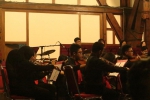Can Social Media Replace the Role of Press in the Digital Era?
By Adi Permana
Editor Adi Permana

BANDUNG, itb.ac.id – The world is changing very fast due to rapid technological advancement. This development has brought countless benefits to our life in a form that is always changing over the years. One aspect that will be highlighted is the evolution of how information is being distributed.
In the past, printed media such as newspapers or pamphlets were the main methods to spread information. Today, information can be spread in increasingly diverse ways from the online news article, video, or social media upload. These new influxes are slowly chipping away the market share of printed media, thus making them go bankrupt. Is this the final sign that marks the end of the route for print media? Will social media finally take over the role of news outlets?
The Deputy Director of News Media Indonesia, Gaudensius Suhardi, addressed this topic in the ITB Studium Generale KU4078 on Wednesday (6/4/2022). He delivered a presentation on how printed media is preserving its existence in this digital era while being overshadowed by digital and electronic media.
To understand this, we first need to answer some questions. Can social media be classified as mass media? And can social media completely replace the role of mass media? "Apart from some official accounts of news outlets, the product of social media is not a work of journalism," addressed Gaudensius.
The base of law that binds journalistic and social media is also different. Journalistic work is subject to the Press Law and Regulation, this means that any lawsuit that is directed towards a news outlet needs to go through the Press Council first. On the other hand, the legal basis for social media content are PUTUSAN MK No. 39/PUU-XVIII/2020 and UU ITE which do not offer the protection of the Press Council.
Gaudensius also emphasized that social media cannot replace the role of the press. Apart from the difference in its legal basis, the procedure of creating a journalistic work and creating social media content is also very different. The first element of Kovach's Elements of Journalism is "Journalism's first obligation is to the truth".
"It translates to how the press is always required to deliver only the truth, because of its high stake in the public decision-making process. Furthermore, the press also directly impacts the economic and political conditions of a nation," he explained.
Therefore, according to Gaudensius, the press and news outlets need to quickly adapt to this digital era. An era in which we have more and more choices in our life, including how we choose to receive information. By adapting, innovating, and increasing its creativity and efficiency, the press can survive or even resurface stronger in this digital era.
Reporter: Yoel Enrico Meiliano (Food Engineering, 2020)
Translator: Favian Aldilla Rachmadi (Civil Engineering, 2019)

.jpg)
.jpg)
.jpg)
.jpg)
.jpg)


